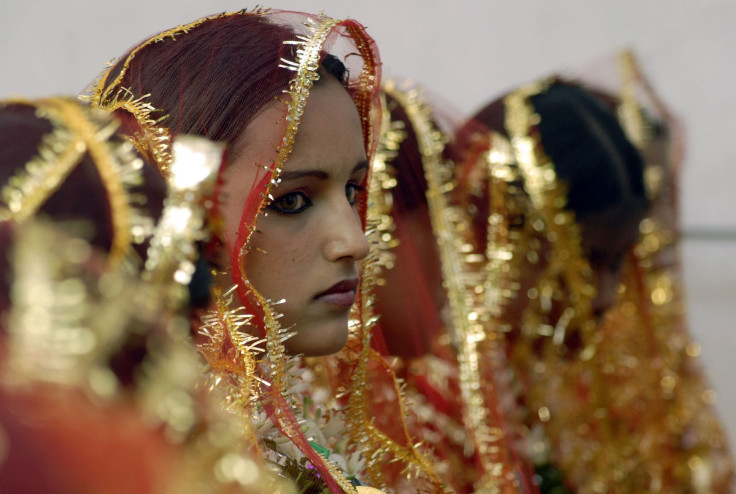Wealthy Sudanese Now Join Arabs In 'Buying' Young Muslim Girls In India [VIDEO]

The plight of Indian Muslim teenage girls who are “sold” to men from the Arab world and North Africa as temporary “wives” has been exposed by a 17-year-old victim.
According to a report in the Daily Telegraph newspaper, Nausheen Tobassum, a teenager from a poor neighborhood in Hyderabad escaped a “contract marriage” to an older Sudanese man last month.
Nausheen’s family forced her to be the man’s “wife” for four weeks in exchange for about $1,840 -- the per capita annual income in India is only about $1,219, according to the International Monetary Fund.
The girl told Hyderabad police that she and three other teenage girls were taken to a hotel where they were introduced to Usama Ibrahim Mohammed, a 44-year-old Sudanese oil company engineer who already has a wife and two children in his native Khartoum.
Subsequently, a “Qazi,” or Muslim priest, performed a wedding ceremony.
The Sudanese man paid Nausheen’s aunt 100,000 Indian rupees (about $1,840) for the girl -- the aunt, Mumtaz Begum, then paid 70,000 Rupees to the girl’s parents, 5,000 rupees to the Qazi, another 5,000 Rupees to an Urdu translator and kept 20,000 rupees for herself.
"The next day [the Sudanese man] came to the house of the victim girl and asked her to participate in sex but she refused. She is a young girl and the groom is older than her father," local police Inspector Vijay Kumar said.
Police arrested the Sudanese “groom,” the girl’s aunt, as well as the Qazi who performed the wedding ceremony.
Arrest warrants have also been issued for Nausheen’s parents, who are believed to be in hiding as fugitives from the law. (However, the Hindu newspaper reported that the parents were already taken into custody).
Such “contract marriages” for the purposes of sex are illegal under Indian law and forbidden by Islam, however, the practice is increasing in the southern Indian city of Hyderabad as wealthy Middle Eastern men, in tandem with the Qazis and other agents seek to exploit the financial misery of impoverished Muslim families.
"If a Sudanese [man] wants to have sex, he has to pay three times more [in Sudan] because there are far fewer girls there, or he takes a second wife,” Kumar said.
“In India the girls are coming for a cheaper rate and they are beautiful. Even if they [the Sudanese] are only staying for a few days they are doing this kind of illegal marriages for sex.”
Since prostitution is banned under Islam, the men in question sidestep that matter by seeking to “marry” the girls they want to have sex with.
The Hindu reported that Nausheen’s parents threatened to kill her if she refused to marry the Sudanese man, even allowing the adult to rape the girl if she rejected his sexual advances.
Usama had entered India on a 40-day tourist visa.
Now, under the protection of the government, Nausheen told local reporters: "I didn't know what was happening and I agreed in ignorance. They forced me. They changed my date of birth certificate and made a fake one, where I was shown as 24 years old. They exploit girls and that's why I went to police. I had to show courage to go to police against my parents. I don't want to go back to my home, I am scared.”
Local human rights campaigners say the problem of “contract marriages” is worsening in the poverty-stricken city of Hyderabad.
"They [foreign men] come to Hyderabad because it has [many] downtrodden families,” said Shiraz Amina Khan of Hyderabad's Women and Child Welfare Society, who noted that at least 15 contract marriages occur in the city every month.
“Thirty to forty percent of [these] families are going for the option of contract marriages to relieve their poverty. It has to be stopped.”
It's unlikely that this practice can be stamped out any time soon given the financial incentives of Hyderabad’s Muslim community and the exorbitant costs of giving away a daughter in a “real” marriage.
The local government periodically suspends Qazis who perform illegal “marriages” between minor Hyderabadi girls and foreign adult men (often Arabs and now Sudanese).
As Sudan develops its oil economy, more men from the North African country can afford such luxuries as “temporary wives” (with Muslim girls from India considered to be a particular prize).
Sudanese are now joining men from Saudi Arabia, the United Arab Emirates, Iran, Oman, Kuwait and Qatar who come to Hyderabad to secure young women to satisfy their sexual urges on the pretence of “marriage.” In some cases, men who are as old as 70 have come to the city to marry preteens.
Ironically, while affluent Sudanese may voyage to Hyderabad to find “wives” (or temporary concubines), the growing black African community in the city finds itself the target of discrimination and prejudice from local officials.
Last summer, young African students in Hyderabad were outraged by comments made by the police commissioner who blamed them for an increase in crime and the drug trade.
Hyderabad Police Commissioner Anurag Sharma’s remarks were branded as “racist” by some African residents of the city.
“Everybody would like to party once in a while and how could one in a respectable position be prejudiced against foreign students?” a Nigerian student told New Indian Express.
An Ethiopian student named Khadeer told the paper: “We are already targeted by the society. This spoils the name of the city among foreigners. We are anyway constantly monitored. To what extent will the move to keep an eye on us help?”
© Copyright IBTimes 2024. All rights reserved.











